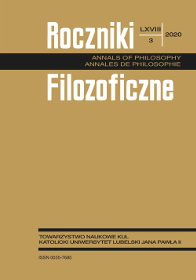Probabilistic Theism and the Classical Doctrine of Actus Purus
Abstract
Dariusz Łukasiewicz’s probabilistic theism arises from a non-classical understanding of the nature of God, especially the attributes of simplicity and omnipotence. The redefinition of these attributes in terms of modern analytical philosophy means that probabilistic theism is closer to open theism than to classical theism. However, an extremely important merit of this approach is the development of a comprehensive scientific component for open theism (which is built on biblical foundations), which means that probabilistic theism enables the extension of open theism to the perspective of modern natural sciences. The fundamental meaning of probabilistic theism is not so much the reconciliation of the occurrence of accidental events with the theory of providence, but rather it gives the possibility of open theism to enter into theistic debates among contemporary scientists, not only philosophers and theologians. Without this, open theism remains within a narrow theological perspective, interesting only to Christian theologians or scientists professing the Christian worldview.
References
Aquinas, Thomas. Summa Theologica. Translated by Fathers of the English Dominican Province. New York: Benziger Brothers, 1911–25.
Aquinas, Thomas. Expositio Super Librum Boethii De Trinitate. Leiden: Brill, 1959.
Łukasiewicz, Dariusz. Opatrzność Boża, wolność, przypadek. Studium z analitycznej filozofii religii. Poznań: W drodze, 2014.
Plantinga, Alvin. Does God have a nature? Milwaukee, WI: Marquette University Press, 1980.
Copyright (c) 2020 Roczniki Filozoficzne

This work is licensed under a Creative Commons Attribution-NonCommercial-NoDerivatives 4.0 International License.





